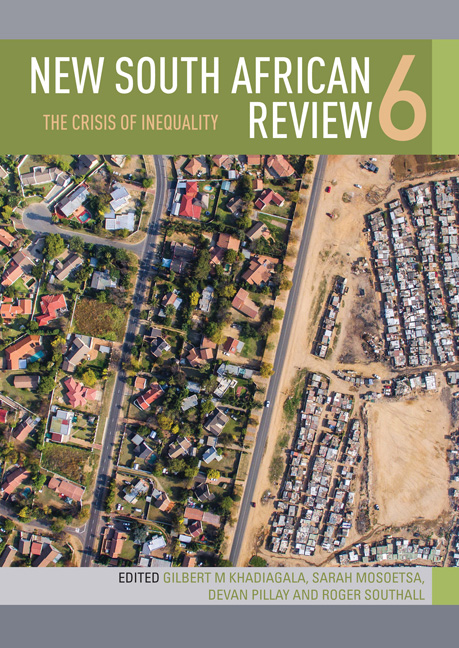Book contents
- Frontmatter
- Contents
- List of tables and figures
- INTRODUCTION: The global crisis of inequality and its South African manifestations
- PART 1 INEQUALITY AND CLASS: POLARITIES AND POLICIES
- PART 2 THE POLITICS OF INEQUALITY
- PART 3 SOCIAL DIMENSIONS OF INEQUALITY
- PART 4 LAND AND ENVIRONMENT
- CHAPTER 12 Spatial defragmentation in rural South Africa: A prognosis of agrarian reforms
- CHAPTER 13 Mining, rural struggles and inequality on the platinum belt
- CHAPTER 14 Challenging environmental injustice and inequality in contemporary South Africa
- CHAPTER 15 The geography of nuclear power, class and inequality
- Contributors
- Index
CHAPTER 14 - Challenging environmental injustice and inequality in contemporary South Africa
from PART 4 - LAND AND ENVIRONMENT
Published online by Cambridge University Press: 23 March 2018
- Frontmatter
- Contents
- List of tables and figures
- INTRODUCTION: The global crisis of inequality and its South African manifestations
- PART 1 INEQUALITY AND CLASS: POLARITIES AND POLICIES
- PART 2 THE POLITICS OF INEQUALITY
- PART 3 SOCIAL DIMENSIONS OF INEQUALITY
- PART 4 LAND AND ENVIRONMENT
- CHAPTER 12 Spatial defragmentation in rural South Africa: A prognosis of agrarian reforms
- CHAPTER 13 Mining, rural struggles and inequality on the platinum belt
- CHAPTER 14 Challenging environmental injustice and inequality in contemporary South Africa
- CHAPTER 15 The geography of nuclear power, class and inequality
- Contributors
- Index
Summary
Environmental injustice is an expression of deepening inequality and is widespread in post-apartheid South Africa but, paradoxically, there is no strong, mass-based environmental movement. Environmental injustice and inequality is evident in poor people's exposure to toxic pollution, and in the lack of access to critical resources, including nutritious food, clean water and affordable energy. This chapter suggests, however, that while there are formidable constraints, a unified, embryonic environmental justice movement could possibly be emerging from the way in which the current ecological crisis is driving new initiatives. These initiatives are: building popular power, promoting counter-narratives such ‘food sovereignty’ and ‘energy democracy’, developing new strategies including formal and informal alliances, a strategic use of the law, innovative tactics and the use of symbolic power with a strong normative dimension to dramatise both the causes and the consequences of the ecological crisis. Grassroots organisations are organising around concrete issues in the everyday experience of working people – especially rising food and energy prices. A growing number of these initiatives are drawing from the travelling and adaptive discourse of environmental justice which has the capacity to connect particularistic local struggles, generalise them and forge global alliances, particularly around one of the most destructive activities on the planet: coal mining.
THE TRAVELLING DISCOURSE OF ENVIRONMENTAL JUSTICE
The concept of environmental justice provides a radical alternative to the discourse of ecological modernisation which has been criticised for its reformism and over-emphasis on consensual politics (Warner 2010). ‘[T]he central argument of [ecological modernisation] is that industrial societies can be made sustainable with only modest adjustments and corrections’ (Warner 2010: 553). Environmental justice also provides an alternative to traditional understandings of conservation, questioning the market's ability to bring about social or environmental sustainability, and represents a powerful challenge to the increasing commodification and financialisation of nature. The emphasis on class in the discourse of environmental justice also presents a challenge to the fashionable notion of ‘the Anthropocene’ as a new geological epoch in which nature is dominated by ‘humanity’ as a universalistic social category (Baskin 2015; Moore 2015). In this paradigm ‘the Indian subsistence farmer [and] the African herder become part of one “humanity” with the inhabitants of the rich world, despite clearly being very differentially responsible for ecological devastation’ (Baskin 2015: 16).
- Type
- Chapter
- Information
- New South African Review 6The Crisis of Inequality, pp. 252 - 267Publisher: Wits University PressPrint publication year: 2018



